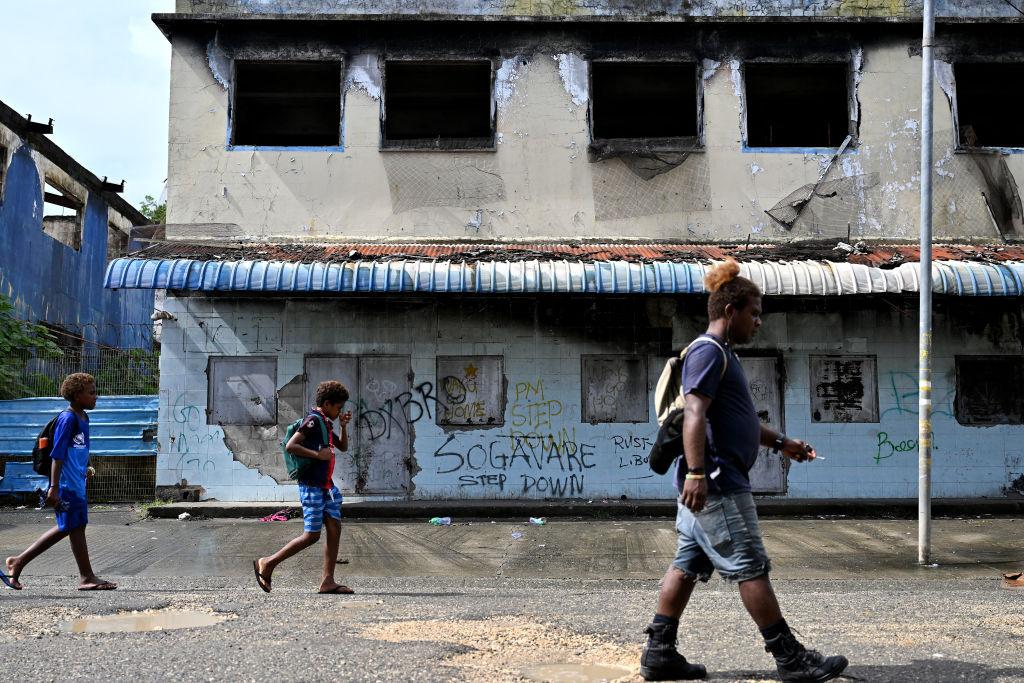After an inconclusive election, Solomon Islands Prime Minister Manasseh Sogavare has withdrawn from the race to lead the country, attributing his defeat to Western foreign influence.
At a post-election press conference on April 29, Mr. Sogavare claimed his government had come “under pressure from the United States and [its] Western allies” and had been “accused of many things.” Despite his party, Ownership Unity and Responsibility (OUR), fielding 43 candidates in the election, won only 15 seats of the 50-seat parliament.
Since September 2019, when he ended the Solomon Islands’ recognition of Taiwan, Mr. Sogavare has been closely aligned with Beijing. The continuity of this alignment under the new government remains uncertain.
In 2022, Mr. Sogavare negotiated a broad security agreement with Beijing, which drew attention during Australia’s federal election campaign and raised concerns in Washington.
This development coincided with the United States’ renewed focus on the Indo-Pacific, illustrated by initiatives like AUKUS.
The U.S. also reopened an embassy in the Solomon Islands last year after a 30-year absence, with Secretary of State Antony Blinken declaring, “The Indo-Pacific region—including the Pacific islands—will shape the world’s trajectory in the 21st century.”
PM Denies Plans Amid Controversy
While the agreement was widely seen as a precursor to a future Chinese Communist Party (CCP) naval base less than 2,000 km from Australia’s east coast, Mr. Sogavare consistently denied such intentions.He dismissed foreign criticism of the agreement in a speech to parliament: “We find it very insulting, Mr. Speaker, to be branded as unfit to manage our sovereign affairs.”
He criticised Australia due to events in 2006 when Australian police conducted a raid on Mr. Sogavare’s office looking for evidence on Attorney-General Julian Moti.
Australian-born Mr. Moti was wanted in Australia for child sexual assault and was later deported.

On a trip to Beijing in July last year, he joined CCP leader Xi Jinping to announce a “comprehensive strategic partnership,” including police training and exchanges. He said he would oppose “any actions that contain or aim to contain China’s development.”
The Prime Minister accused Canberra of meddling in the Solomon Islands’ internal affairs and demanded the withdrawal of Australian police. However, in 2021, he requested their return to help restore order in Honiara during anti-government riots, which included the torching of his family home.
Six months later, he signed the security pact with Beijing.
Despite Beijing pouring money into the country under his rule, Mr. Sogavare barely won his East Choiseul seat in the recent vote. Opponents highlighted issues such as depleted health services lacking medicine while CCP funds were allocated to build sports stadiums.

The opposition parties, who criticised the arrival of Chinese police in the archipelago in 2022, have formed a coalition and are also seeking the support of independents to reach the 26 seats needed to form a government.
Assuming the OUR party remains in power, many commentators are picking that Mr. Sogavare’s departure is unlikely to herald any significant change in Honiara’s foreign policy.
His expected successor, Jeremiah Manele, served as foreign minister when the security deal with China was signed.
Mr. Manele has vowed to continue his predecessor’s “friends to all and enemies to none” approach, which in theory means avoiding taking sides in the territorial rivalries between Beijing and Washington.
Electors Appear to Have Voted on Local Issues
However, Solomon Islands politics are rarely straightforward, and there appears to be no direct correlation between the election results and anti-Beijing sentiment among voters.Although the Solomon Islands Development Party (SIDP) and the United Party, led by Matthew Wale and Peter Kenilorea Jr. respectively, did manage to win new seats, they also saw 40 percent of their sitting MPs lose theirs.
In Malaita province, led by vocally anti-Beijing governor Daniel Suidani and where 2021’s anti-Sogavare riots are said to have started, half of the OUR party’s incumbents retained their seats—a better result nationally.
During the campaign, Mr. Kenilorea stated that his party would reject the relationship Mr. Sogavare has built with Beijing in favour of reestablishing ties with Taiwan, while Mr. Wale has consistently attacked the outgoing PM for his alignment with the CCP.

Independent candidates emerged as major winners despite having no track record on the issue. The sudden realignment to Beijing has not delivered any noticeable benefits to ordinary people, who still struggle with the lack of necessities like adequate healthcare, affordable education, and economic opportunities, especially for the large youth population.
Despite the pushing relations with Beijing to the forefront of their campaigning by political leaders, voters appear to have decided the election based on concerns more relevant to their daily lives.
The outcomes of the new independents will play a crucial role in determining the government’s final composition, with potential repercussions for Beijing.
Despite these developments, former Prime Minister Sogavare’s financial situation appears favorable, as revealed by the Organized Crime and Corruption Reporting Project (OCCRP).






